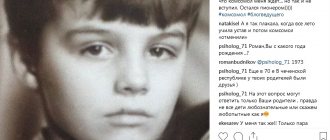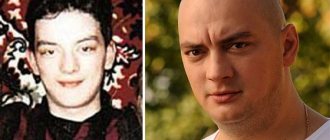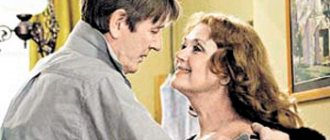Roman Polanski
Roman Polanski
| Date of Birth | August 18, 1933 |
| Place of Birth | Paris, France |
| Occupation | film director, film producer, actor, screenwriter |
| Awards and prizes |
Roman Polanski
(English: Roman Polanski,
Rajmund Roman Liebling
, Polish: Rajmund Roman Liebling) is a Polish and French film director of Jewish origin.
[edit] Early years
Raimund Roman Liebling was born on August 18, 1933 in Paris into a Jewish family.
At the age of 3, he moved to Poland with his family, settling in Krakow (where his father’s family lived).
During the German occupation they were interned in the Krakow ghetto. Mother, Bula Liebling (nee Katz), died in the Belzec concentration camp. Father, Ryszard (Moisesz) Liebling (1903–1984), survived in Plaszow and Mauthausen.
After the liquidation of the Krakow ghetto and until the end of the war, the future film director hid in a Polish family.
[edit] Career
In 1945, he managed to find his father, who sent him to study at a technical school, but soon began working on children's television, playing in radio shows and in the theater: he played the title role in the production of Valentin Kataev's popular story "Son of the Regiment" (1948, Warsaw Theater for Young Spectators ).
Polanski decided to connect his life with cinema after watching the British film Dropout.
In 1953, he acted in films for the first time, starring in the film “Three Stories”.
In 1962, he made his directorial debut with the film Knife in the Water.
Then he emigrated to France and then to the USA.
short biography
Roman Polyansky was born in Omsk. This happened on November 9, 1983. He began to show his talent from a very early age. While still in kindergarten, he began performing on stage. He played in the production of The Nutcracker. After that, it became clear to everyone that he could grow into a wonderful actor.
Roman studied well at school. He often took part in cultural events. But most of all he was pleased with sports competitions. He even thought about a sports career. However, his mother, who was a gymnast, dissuaded him.
The parents decided to develop their child's talents. They enrolled Roman in a music school. For 6 years the boy studied playing the clarinet. Then there was a music school, where the actor mastered playing the tenor saxophone.
In his 2nd year, he met Irina Mikhailovna Ponomareva, who taught art history. She invited Roman to her theater. It was from this moment that his acting career began.
In 2004, Roman Polyansky entered the Shchukin School. He received his education under the guidance of Ivanov.
[edit] Awards
In 1974, he won the Golden Globe Award for Best Director and the BAFTA Award for Best Director.
In 1980 and 2014, he won the Cesar Award for Best Director.
In 2002, he won the Oscar for Best Director, the National Society of Film Critics Award for Best Director, the Palme d'Or at Cannes and the BAFTA Award for Best Director.
In 2010, he won the Silver Bear Award for Best Director.
In February 2020, feminist organizations opposed the awarding of the Cesar Prize to Polanski, which could be awarded to him for the film J'accuse ("I Accuse")[1].
On February 28, 2020, the Cesar film awards ceremony took place in Paris. Roman Polanski won the Best Director award for his film An Officer and a Spy. Polanski did not come to the ceremony for fear of being lynched. An Officer and a Spy was nominated for 12 César categories, ultimately winning three: Best Director, Best Adapted Screenplay and Best Costumes.
Roman Polyansky now
In May 2020, a new page appeared in Roman’s creative life. The actor starred in a candid video by Ukrainian performer Alina Grosu. According to the singer, Polyansky embodied on the screen the image of a man, next to whom you want to reveal your bright side. The clip was liked not only by fans of the artist, but also by connoisseurs of Roman’s work.
In the same year, the comedy detective film “Galka and Gamayun” was shown on the screen, in which Polyansky played the role of police captain Oleg Kachalov. The handsome man is not averse to starting an intrigue on the side, which his pregnant wife finds out about and decides to commit a crime. In the film, which was warmly received by the public, the main roles were played by Irina Pegova and Anna Snatkina. Evgenia Osipova performed as the wife of Polyansky’s hero.
View this post on Instagram
A post shared by Roman Polianskiy (@roman_polianskiy) on Jan 6, 2020 at 9:05am PST
Roman Polyansky in 2020
Now the actor’s collection of roles in melodramatic TV series continues to grow. These are the main characters of the films “Romance with the Past”, “City of Brides”, “Pure Psychology”.
In the project “From Hate to Love” he played a charming heartthrob capable of treacherous deeds. Unlike many of his colleagues, Roman often performs all the stunts himself. In this film he had to climb balconies on his own.
[edit] Family
In 1959-1962 he was married to actress Barbara Kwiatkowska (1940-1995), a Polish woman.
In 1965, he met the American actress and model, who later became his wife, Sharon Tate (1943-1969).
In 1969, Polanski's success in Hollywood was overshadowed by the murder of his pregnant wife and three friends by members of the Charles Manson gang.
In 1976, he began dating 15-year-old actress Nastassja Kinski.
In 1989, the director's third wife was the French actress and model Emmanuelle Seigner (born in 1966); she bore him two children - a daughter, Morgana Polanski, who became an actress, and a son, Elvis. Polanski starred his third wife in his films Furious, The Ninth Gate, Bitter Moon and Venus in Fur.
[edit] Rape allegations
In 1977, the director was accused of raping a 13-year-old girl, Samantha Geimer (Samantha Gailey):
In 1977, 44-year-old Roman Polanski seduced 13-year-old Samantha Geimer. First, he turned to the girl’s mother with a request to allow him to take a series of photographs of Samantha for the French Vogue magazine. During a second photo shoot on March 10, 1977, at Jack Nicholson's Hollywood estate, he gave the girl champagne laced with a rape drug. The investigation materials detail Samantha's testimony about how Polanski had sex with her, including oral and anal[2].
German actress Renate Langer claimed that Polanski raped her in February 1972 at his home in the Swiss village of Gstaad, and that she was 14[3] or 15 years old[4] at the time.
There were other accusations:
A woman who identified herself as Robin claimed that Polanski sexually assaulted her in 1973. She was 16 years old at the time.[5].
American artist Marianne Barnard stated that Polanski molested her when she was 10 years old, this allegedly happened in 1975[6].
English actress Charlotte Lewis stated that Polanski forcibly possessed her in a Parisian house during the filming of the film Pirates in 1983, when she was 16 years old.[7]
In October 2020, French actress and photographer Valentina Monnier accused director Roman Polanski of rape, which allegedly occurred in 1975, when she was 18 years old.[8]
[edit] Criminal prosecution
In September 2009, the director arrived in Switzerland to receive an award for his directorial work. Organizers of the Zurich Film Festival said the filmmaker was arrested by police on September 26, 2009, on a US warrant dating back to 1978, as well as an international arrest warrant from 2005. French Culture Minister Frederic Mitterrand said he was shocked by Polanski's arrest.
On July 12, 2010, Swiss authorities refused to extradite Polanski to the United States to the American government and released the director from house arrest.
On October 30, 2014, Polish Deputy Foreign Minister Rafal Trzaskowski said that Poland sees no reason to detain Roman Polanski and hand him over to US authorities.
In October 2020, a Polish court refused to extradite Polanski to the United States because the victim [Samantha Geimer] had repeatedly confirmed that she had no claims against Roman Polanski.
Polanski, Roman
Childhood
Roman Polanski was born in Paris, France, on August 18, 1933 into a Jewish family. He had an older sister, Aneta, from his mother's first marriage. When he was three years old, his parents returned to Poland and settled in Krakow (where his father's family lived)[7]. During the German occupation they were interned in the Krakow ghetto. His mother, Bula Liebling (née Katz-Predborska)[8], died in Belzec, and his father, Ryszard (Moisesz) Liebling (1903–1984), managed to survive in Plaszow and Mauthausen. After the liquidation of the Krakow ghetto until the end of the war, the boy, by agreement with his father, was sheltered by a Polish family. He recalls that the Nazis used him as a target for shooting. Having survived the Second World War and surviving in the Krakow ghetto, Polanski found himself in art. In 1945, he managed to find his father, who sent him to study at a technical school, but soon Roman began working on children's television, playing in radio shows and in the theater: he played the main role in the production of Valentin Kataev's popular story "Son of the Regiment" (1948, Warsaw Theater young viewer). Roman decided to connect his life with cinema after watching the English film “Eliminatory”, which made a strong impression on him.
Polish period
Roman Polanski's youth occurred during the socialist period in the history of Poland. In 1953, the twenty-year-old actor appeared in films for the first time; in 1955 he gets a role in the film “Generation” by Andrzej Wajda - Wajda helps him enter the Film School in Lodz.
One of Polanski's directorial works was the short film "Murder" (1957): someone enters a room and kills a sleeping man. The horror film lasted two minutes. Another of his student films, Two Men with a Wardrobe (1958), received 5 international awards, including a bronze medal at the World Exhibition in Brussels. Polanski graduated from film school in Lodz in 1959.
In 1959, Polanski married actress Barbara Kwiatkowska, with whom he remained married until 1962. In the same year, Polanski made his first feature film, Knife in the Water, which was coolly received in Poland, but created a sensation at foreign festivals and was nominated for an Oscar as best foreign film.
Anglo-American period
After filming the film, Polanski moved to France, where he met Gerard Braque. Together they wrote the scripts for the films Repulsion (received the Silver Bear at the Berlin Film Festival) and Dead End (received the Golden Bear). These two films were shot in England, where the director lived from 1964 to 1968.
In 1968, after marrying American actress Sharon Tate, whom he met on the set of his first color film, The Fearless Vampire Hunters, he moved to the United States. He made his Hollywood debut with Rosemary's Baby (1968), which became a landmark in the history of cinema. Mia Farrow played the main role in the film.
Polanski's success in Hollywood was overshadowed by the murder of his pregnant wife Sharon and three friends in 1969 by members of the Charles Manson gang. After the murder, Polanski went to Europe for several years. This tragedy greatly influenced all of his further work.
In 1974, Polanski returned to the United States, where he shot the film Chinatown, based on a script by Robert Towne, starring Jack Nicholson and Faye Dunaway. The film won a Golden Globe for directing and was nominated for an Oscar in 11 nominations (it was beaten by The Godfather 2 in almost all categories).
Criminal prosecution
| External images | |
| (unspecified) (inaccessible link). Accessed September 29, 2009. November 28, 2012.[9] | |
In 1977, Polanski was accused of raping a thirteen-year-old girl, Samantha Geimer (then known as Samantha Gailey), at actor Jack Nicholson's Los Angeles home. Fashion model Geimer, whom Polanski allegedly invited to shoot for the French edition of Vogue, recalled that Polanski gave her champagne and the drug Quaalude (methaqualone)[10], after which he forced her to have oral and anal sex[11][12]. After his arrest and arraignment, Polanski pleaded guilty to sexual relations with a minor in order to reduce the charges through a plea agreement[13], as he was initially accused of raping a child under the age of 14 with the use of alcohol and drugs.[14] Before his sentencing, and as part of an agreement between prosecutors and the director's lawyers, Polanski agreed to undergo a three-month psychiatric examination at the Chino Prison Hospital in California. Upon his return from prison, Polanski was informed by his lawyer that the judge hearing his case had informed him that he had changed his position and did not intend to accept the prosecutor's recommendation that Polanski receive a suspended sentence without imprisonment. This was a violation of the agreement reached by the director's lawyers with the prosecutor's office and previously approved by the same judge, and on February 1, 1978, immediately before the sentencing, Polanski fled from the United States to the UK (London). And then, in order to avoid extradition, to France, he also lived in Switzerland and Poland[15].
Subsequently, other accusations surfaced in the press. For example, British actress Charlotte Lewis stated that the director forcibly took possession of her in a Parisian house during the filming of the film Pirates in 1983, when she was 16 years old[16][17].
In May 2020, the US Film Academy expelled Polanski from its ranks. In April 2020, the director's lawyer filed a petition to restore Polanski's status in the American Film Academy[18].
French period
At Cannes with Emmanuelle Seigner (1992).
The director shot subsequent films in Europe, mainly in France.
In 1979, the film Tess was released, for which Polanski was nominated for an Oscar in 1981 and also received a Cesar Award. Polanski dedicated this painting to his murdered wife Sharon Tate. The leading role, German actress Nastassja Kinski, became Polanski's mistress at the age of 15[19][20][21]. Earlier, in 1976, she starred in a photo shoot for the French magazine Vogue, of which Polanski was a guest editor.[22][23]
In 1989, Polansky's third wife was the French actress and model Emmanuelle Seigner; she bore him two children - a daughter, Morgana, and a son, Elvis. Polanski cast her in his films Furious, The Ninth Gate, Bitter Moon and Venus in Fur, Based on a True Story, An Officer and a Spy.
In 1999, Roman Polanski directed the mystical thriller The Ninth Gate, in which Johnny Depp played the leading role.
In 2002, the director turned to the personally painful topic of the Holocaust - he made the film “The Pianist.” The jury, headed by David Lynch, awarded the film the Palme d'Or at the Cannes Film Festival, and Adrien Brody, who played the lead role, became the youngest winner of the Oscar for Best Actor.
In February 2020, he was awarded two Cesar Awards for Best Director and Best Adapted Screenplay (An Officer and a Spy).[24]
Extradition decisions in Switzerland and Poland
In September 2009, Roman Polanski arrived in Switzerland to receive an award for his directorial work. Organizers of the Zurich Film Festival said the filmmaker was arrested by police on September 26, 2009, on a US warrant dating back to 1978, as well as an international arrest warrant from 2005. Since Polanski admitted guilt and fled from trial, according to American laws, the principle of limitation does not apply to him[25].
French Culture Minister Frederic Mitterrand said he was shocked by Polanski's arrest. The ministry’s communiqué said that Mitterrand regretted the arrest of the director and the French minister “was surprised to learn about the actions against Roman Polanski, a world-famous film director and French citizen, who was detained in Switzerland,” the document reported [26].
Several dozen famous filmmakers signed an appeal in support of Polanski. Among them are Woody Allen, David Lynch, Martin Scorsese, Wim Wenders, Darren Aronofsky, Terry Gilliam, Pedro Almodovar and others.[27][28] Famous actresses Fanny Ardant and Monica Bellucci also expressed their regret over Polanski's arrest.
The heads of the foreign ministries of France and Poland stated that they intend to appeal to US President Barack Obama so that he would pardon Polanski and close the criminal case against him[29]. California Governor Arnold Schwarzenegger refused to pardon the director[30]. The Los Angeles Court of Appeal also refused to dismiss Polanski's case.[31]
While the director was under arrest, his new film “Ghost” premiered at the Berlin Film Festival; The film was awarded the Silver Bear for Best Director. On July 12, 2010, Swiss authorities refused to extradite Polanski to the United States to the American government and released the director from house arrest.
On October 30, 2014, Deputy Minister of Foreign Affairs of Poland Rafal Trzaskowski stated that Poland sees no reason to detain Roman Polanski and hand him over to US authorities[32].
In October 2020, the Polish court (as previously the courts of other European states) refused to extradite Polanski to the United States. The courts took into account that the victim herself, having become an adult, repeatedly confirmed that she had no claims against the director[33].
[edit] Filmography
[edit] Director
- 1962 - Knife in the water / Nóż w wodzie
- 1965 - Repulsion
- 1966 - Dead End / Cul-de-Sac
- 1967 - The Fearless Vampire
- 1968 - Rosemary 's Baby
- 1971 - Macbeth / The Tragedy of Macbeth
- 1972 - What? / What?
- 1974 - Chinatown / Chinatown
- 1976 - The Tenant / Le Locataire
- 1979 - Tess / Tess
- 1986 - Pirates / Pirates
- 1988 - Frantic / Frantic
- 1992 - Bitter Moon / Bitter Moon
- 1994 - Death and the Maiden / Death and the Maiden
- 1999 - The Ninth
- 2002 - The Pianist / The Pianist
- 2005 - Oliver Twist / Oliver Twist
- 2009 - The Ghost / The Ghost Writer
- 2011 - Carnage / Carnage
- 2013 - Venus in furs / La Venus à la fourrure
- 2017 - Based on real events / D'après une histoire vraie
- 2019 - Officer and Spy / J'accuse
[edit] Short films
- 1955 - Bicycle / Rower
- the film is not finished - 1957 - Murder / Morderstwo
- 1957 - Let's break up the dance / Rozbijemy zabawę
- 1957 - Toothy smile / Uśmiech zębiczny
- 1958 - Two men with a wardrobe / Dwaj ludzie z szafą
- 1959 - Lamp / Lampa
- 1959 - When angels fall / Gdy spadają anioły
- 1961 - Thick and thin / Gros et le maigre, Le
- 1962 - Mammals / Ssaki
- 2007 - Everyone has their own cinema / Chacun son cinéma
- episode “Erotic Cinema” - 2009 - Greed, a new fragrance by Francesco Vezzoli / GREED, a New Fragrance by Francesco Vezzoli
- 2012 - Therapy / A Therapy
[edit] Actor
- 1953 - Three stories / Trzy opowieści
(segment
Jacek
) - 1959 - Magic bicycle / Zaczarowany rower
- 1959 - Three starts / Trzy starty
- 1955 - Bicycle / Rower
- 1955 - Generation / Pokolenie
- 1956 - An extraordinary career / Nikodem Dyzma
- 1957 - Shipwreck / Wraki
- 1957 - End of the night / Koniec nocy
- 1958 - Eroica / Eroica
- 1958 - Two men and a wardrobe / Dwaj ludzie z szafą
- 1958 - Call my wife / Zadzwońcie do mojej żony?
- 1959 - When angels fall / Gdy spadają anioły
- 1959 - Flying / Lotna
- 1960 - Cross-Eyed Happiness / Zezowate szczęście
- 1960 - Goodbye, see you tomorrow / Do widzenia, do jutra
- 1960 - Innocent sorcerers / Niewinni czarodzieje
- 1961 - Beware the Yeti! / Ostrożnie, Yeti!
- 1961 - Thick and thin / Le Gros et le maigre
- 1961 - Samson / Samson
- 1962 - Knife in the water / Nóż w wodzie
(voice) - 1965 - Repulsion
- 1967 - The Fearless Vampire Killers ("Ball of the Vampires") / The Fearless Vampire Killers
-
Alfred - 1969 - The Magic Christian (other name: The Miracle Worker
) /
The Magic Christian
- drunkard - 1970 - Ciao, Federico! (French) Russian. / Ciao Federico!
(documentary by Gideon Bachmann about the filming of Satyricon) - 1972 - What? / What?
—
Mosquito - 1974 - Blood for Dracula / Blood for Dracula
- 1974 - Chinatown / Chinatown
- 1976 - The Tenant / Le Locataire
- 1982 - Leapfrog / Chassé-croisé
- 1989 - Waiting for Godot / En attendant Godot
(TV) - 1992 - Back in the USSR (film) (English) Russian. / Back in the USSR
-
Russian mafioso Kurilov - 1994 - Pure formality / Una Pura Formalita
- 1994 - The insidiousness of fame / Grosse fatigue
- 2000 - Tribute to Alfred Lepetit / Hommage à Alfred
- 2002 - Revenge / Zemsta
- 2007 - Rush Hour 3
-
Commissioner Revy - 2008 - Quiet chaos / Caos calmo
[edit] Sources
- "Cesar" found himself under charges
- Sex scandals: Roman Polanski
- German actress Renate Langer accused director Roman Polanski of rape
- Greetings from the past: Roman Polanski was accused of raping a minor for the fourth time
- Roman Polanski was accused of another rape of a minor
- Roman Polanski is accused of sexually assaulting a 10-year-old girl
- Polanski accused of another rape of a minor
- Another woman has accused Polanski of rape
Theater
In 2008, Roman graduated from “Pike” and became an actor at the Vakhtangov Theater, although he began participating in its productions in his fourth year: these were the plays “Macbeth” and “White Acacia”. Having become part of the troupe, Polyansky was involved in 6 performances.
Roman Polyansky in the play “Chasing Two Hares”
A year later, Polyansky was invited by the famous theater director Roman Viktyuk to participate in the plays “Romeo and Juliet” and “Ferdinando” based on the play by Annibale Ruccello. Since then, Polyansky considers Viktyuk one of the three people who shaped his idea of acting.
Roman Polyansky in the production of “Ferdinando”
For several years now, the actor has been involved in theater enterprises in the performances “The Elder Son” and “Othello”, with which Polyansky tours the cities of the country.
Roman Polyansky in the play "Othello"











